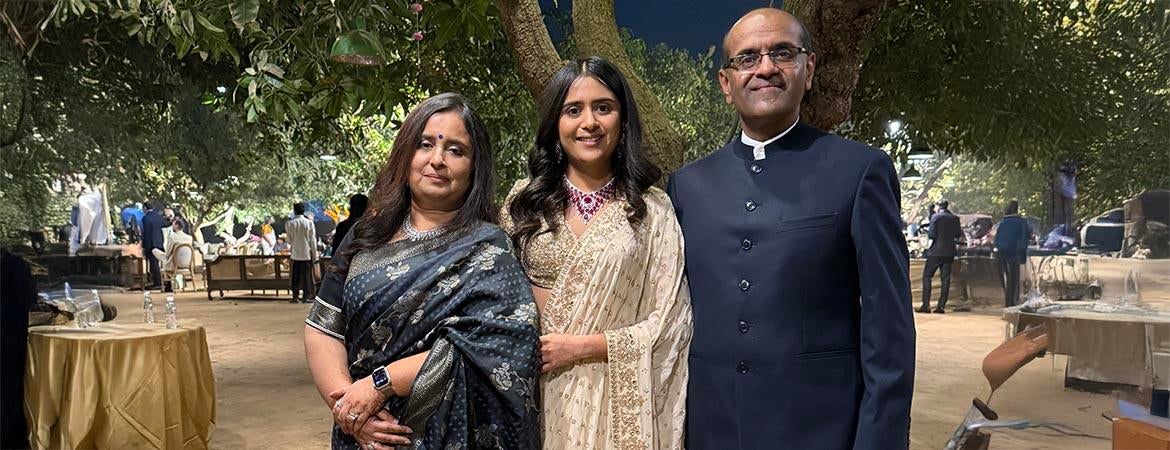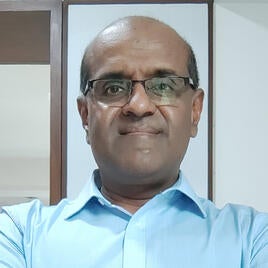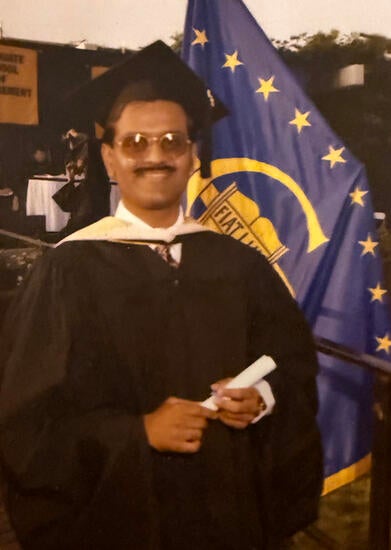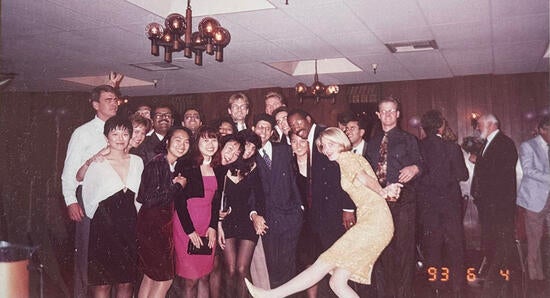

Jagat Bakeri ’94 MBA arrived at UCR from India eager for an education that would help him follow the family tradition of entrepreneurialism. Walking to class during his first week on campus, new accounting books in hand, an unexpected sound stopped him in his tracks.
“I heard some jazz from somewhere and I just followed the music,” Bakeri recalled. “I opened the doors and there were students playing cello, saxophone, drums. For a second, I thought, ‘Did I enroll in the wrong master’s program?’”
On the contrary: As his education and business career would prove, he was in the right place.
Still, the chance encounter was a turning point. Already an accomplished musician, Bakeri began frequenting the school’s music library, where he discovered a book that changed his perspective on music — and business.
“That book pretty much taught me how every instrument adds up and how can you differentiate them while listening,” he said. “It doesn't start with the whole orchestra. It's maybe just you and the pianist, and then slowly the band keeps on increasing. Every instrument comes in slowly and builds the momentum.
“That's also how you grow a business.”
Coincidentally, the name of the company where he applies his skills today is Symphony Limited.
Professional, personal, practical
Bakeri is director of Global E-commerce and Direct to Consumer sales for the world’s largest manufacturer of air coolers, with headquarters in India and a presence in more than 60 countries, including Australia, Brazil, China, Mexico, and the United States.
He credits his MBA experience with preparing him for his current role in corporate leadership, as well as the entrepreneurial journey that preceded it. But at first, he just needed to find a way to pay for his education.
Although he arrived at UCR with a degree in mechanical engineering (along with bachelor’s and master’s degrees in music), he applied for a job as a university groundskeeper. He was promptly told he was overqualified.
“And then I got a teaching assistantship because of my mechanical engineering background,” he said. “I was lucky I could get that and cover most of my education expenses.”
Meanwhile, his pursuit of an MBA was an eye-opening experience for someone who had studied engineering but had no interest in that as a career. He connected with professors who kept open-door policies and taught not just concepts but real-world applications.
“The method of education was so professional, yet personal and practical,” Bakeri said. “I could see that if these principles were put to good use in a methodical manner, then you could save so much time in building up a business in a much shorter period of time.”
Family influence
He also started to see parallels to his family’s entrepreneurial experience, something he credits to the pioneering influence of his grandmother.
"Her husband, my grandfather, worked for the government of India during the Imperial period, and she wanted all her sons to be businessmen!" he said. “She said, ‘I'm going to make sure that my kids become educated so they can own a business.’ So she saved money and got to see all her sons, one by one, become businessmen.”
Bakeri grew up hearing his parents discuss business. But as he studied at UCR, his appreciation grew for what it takes to succeed. He especially enjoyed courses on consumer behavior and welcomed opportunities for practical application on projects with product research, development, and marketing.
“It taught me how to communicate my ideas, put them in the right place, formulate them, do the methodical planning, and then execute them,” Bakeri said.
He was drawn to Riverside because of a brother’s experience studying at USC, but also for the robust business climate of Southern California. At the same time, he always knew he would take his education back to India to start his own business. And that is what he did.
Renewed appreciation for UCR
In 1994, while he and his wife were still engaged, they began setting up their business, a children’s clothing company — an innovative concept for India, where children’s wear at the time typically was made in the home by a visiting tailor.
She managed the operations, including design, development, and manufacturing, while he covered sales, marketing, and finance. An enduring partnership with his wife has been the most important aspect of his career, Bakeri said.
“She has been my rock and my strongest pillar of support throughout my journey of 30 years,” he said. “I am very lucky to have someone by my side who is my best critic and my best cheerleader.”
The company was one of the fastest growing indigenous clothing chains in India. As it grew, it began adding its own retail stores. That carried its own leadership challenges.
“You are a trainee as well as a boss and you're manufacturing and you're marketing and you're looking at the business verticals, team building, getting everyone aligned to your vision, building up leadership within them, charting out their career paths so that they also move up in life,” he said.
The experience renewed his appreciation for his time at UCR.
“To see a university operate with such precision, there has to be a wonderful backend setup and organizational behavior where everyone aligns to what the students are there for,” he said.
Navigating turbulence
Over the course of 25 years, the company persisted through multiple challenges: The Sept. 11 attacks, the Great Recession, political unrest, and dramatic tax changes that made inventory unsellable.
“It sends shivers up your spine when it happens,” he said. “How to manage in those times is something that education helps. When you've gone through crazy business cycles where you pretty much lost all your net worth twice and you bounce back, I think that's where the foundation of education helps.”
Still more dramatic disruptions were coming, though. Founded as a brick-and-mortar company, the business adapted to digital marketing and e-commerce around 2018. But then came the pandemic.
“We actually grew during COVID because of e-commerce, but we did not grow profitably,” he said. “So my passion changed, and I got a huge opportunity with Symphony Limited, which had a nascent digital e-commerce vertical.”
But before he took that job, he had another to finish.
Respect for workers
Bakeri said the culture of his company was to always respect everyone who worked there. Business was conducted with integrity, in good times and bad.
“We made sure that we did not delay any bank payments. We never filed for bankruptcy. We made sure that every employee was paid,” he said.
That philosophy did not end when the business wound down. Many of his employees had been working with him for more than a decade, and Bakeri knew they lacked experience in finding a new job.
“I brought all their resumes up to date. I walked through interviews with them so they would know what kind of questions they would be asked. I set up the interviews for them, and then finally I negotiated the salaries for them. Once everyone got settled, that's when I moved to my new job.”
Time-honored practices for a new era
Though he earned his MBA more than 30 years ago, Bakeri still draws on the lessons he learned then — along with the new ones he is learning and the enduring principles that have guided his career.
Music remains “the backbone” of his life. For someone who began studying classical Indian music at age 7 and learned more than 100 Hindu ragas, he has broad tastes. Before he left the U.S., he made a point to attend concerts of Elton John, Eric Clapton, and Dire Straits — and he changed his flight home so he could see Pink Floyd perform. Most recently he saw singer-songwriter Dua Lipa and the Phantom of the Opera.
(Some side advice he offers to business students: “When you are traveling for business, if you have the flexibility of changing dates, make sure you are watching a good concert when you're there!”)
In his three years at Symphony, he has seen the company grow across the world. And it is well-positioned to weather the current uncertainty of global trade. Even so, he sees one common thread through his business career: “There was no fear of failure.”
His daughter, who recently followed the family tradition by launching her own beauty tech company, confirmed this in a recent conversation.
“I just asked her, ‘What was one thing visible to you when we were building our business?’ She said, ‘We were pretty much the same whether we had money or we did not have money,’" he said.
“Now, ambition is very important to make money, but having no fear of failure was also important,” he said. “I think integrity, persistence, patience, our belief regarding failure, and honesty — these are pretty much the foundation of what we have done in all these years.”

